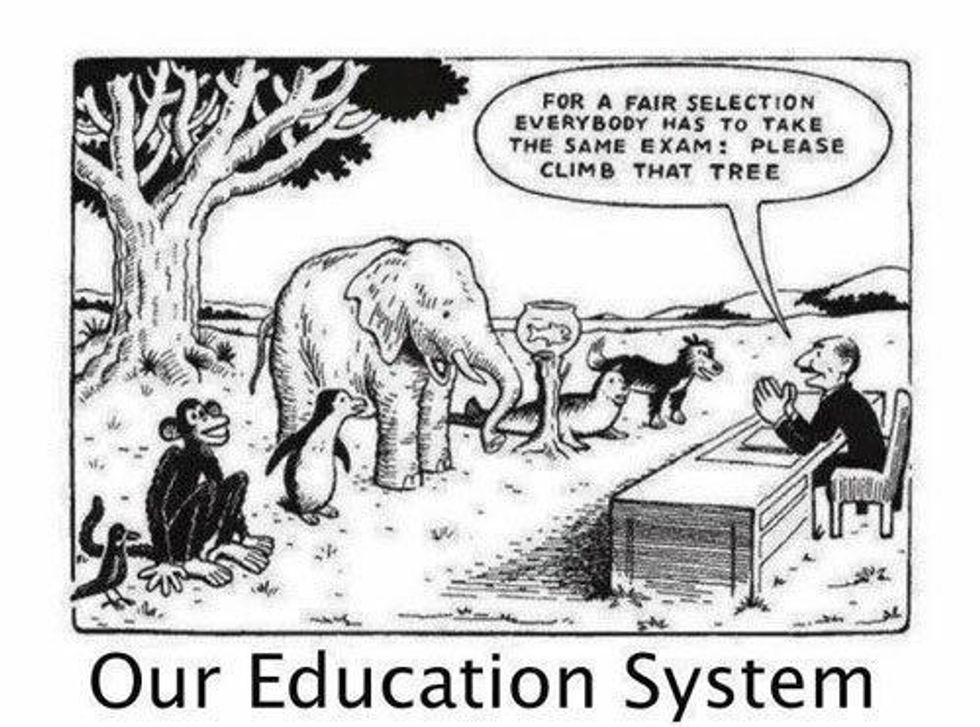Children have fantastic imaginations. Imaginary friends, active play dates, arts and crafts, and endless days playing games outside. Somewhere between an active child and adulthood, the imagination dies down; the imaginary friend goes away, and the hours spent playing games become hours spent scrolling on social media. Soon after, adulthood is reached, and nine to five becomes a routine.
But the question is where and when does this blur occur when a child loses his or her creativity? Is it natural? Inherited? Learned? Taught?
Creativity, however, cannot be taught, but is a skill born into people. While learning, growing, and becoming properly educated, this vital skill of creativity begins to fall to the wayside, and sometimes is even killed off.
Stumbling upon a TED Talk by Sir Ken Robinson, he touched on the idea of how school and education itself is killing creativity.
In the video, he discusses how before the 19th century, there were no public schools. With the world becoming industrialized, students were being taught the importance of work and labor -- skills to successfully get a job, rather than honing their creative abilities.
Often told "You'll never get a job doing that", leads to discouragement, and leads the creative kinds into job(s) that they may end up hating. “Many creative brilliant, talented people think they’re not, because everything they were good at during school wasn’t valued, or was stigmatized." says Robinson.
Subjects such as creative writing, art, music, dance, and theater are being pushed to the side to emphasize the importance of STEM (science, technology, engineering, and math). A decade ago, the No Child Left Behind and Common Core programs prioritized science and math over other subjects. (Danny Gregory). Now, don't get me wrong, STEM subjects are [super] important, and vital to know, but too much emphasis on these subjects strains the brain, and drains creativity of the 'artsy' students. It is forcing something into the minds of people who are just not good at it, aka right brainers.
"In the urban high schools...almost all of them had eliminated all arts, music, and electives during 9th and 10th grades. In each case the reason given was “... a lack of funding.” But the real story was that funding had nothing to do with the cancellation — no matter what funding was available, there was no room in the curricula for these courses anymore. The elective class periods had all been preempted for standardized test prep." author and math teacher D.A. Russel says in his article Cancelling High School Electives, Arts, and Music - So Many Reasons, So Many Lies posted to the Huffington Post.
"Real intelligence is what you use in academic studies: children are born with different amounts of this intelligence, and so naturally some do well at school and some don’t" - Dr. Ken Robinson and Lou Aronica.
During the time between my sophomore year in high school, and my freshman year in college, I felt myself lose my creative side. Before high school, I would spend hours on the computer memorizing ever aspect of Microsoft Word to perfect my short stories. Stories about friendships, hopeless teen romantics, high school drama, coming of age tales, anthromorphic animals; you name it, I wrote it. I blamed my laziness and lack of creativity on puberty, not knowing the real reason was school. I was being programmed to an eight hour schedule of math (geometry and algebra which I never used beyond high school), science (reading straight from a the textbook everyday), Spanish (which I barely learned/speak), gym (with no emphasis on the importance of health) and AP English (with a heavy focus on Old English literature. Can I get something more relatable?!) When I was not in class learning useless tactics, we were prepping for test: standardize test and SAT's (which I failed miserably because test taking is not my thing). Testing was the ultimate goal, no matter if you knew the information or not. You were a robot. A number, essentially, in thousands lost in the public school system.
When I arrived at college, I thought I would be able to fully expand my creative potential by majoring in Journalism. While the writing was a little more structured than creative writing, but less [strict] than standard English writing, I molded myself into the perfect journalist. That was, until, the creative me decided to stand out one day. My nails were an electric blue as I waltzed into class handing in my article to my professor. I was about an event a modeling troupe on campus held the day before. With an interest in fashion (hoping to be a fashion journalist), I thought this was the perfect idea. My professor instantly turned her nose up stating that a job as a fashion journalist would get me nowhere. And, no one would hire me with blue nails. Feeling, defeated, I accepted the comment and decided to become a news anchor.
My heart wasn't in hard hitting news. Yes, it was important, but it wasn't for me. I like to dazzle my audience with my words about things teenagers and young adults do care about -- celebrities, fashion, arts, entertainment, culture, food, relationships, etc.
I felt lost for the rest of my college career. I had no idea what I wanted to do with my life from that one discouraging comment. But out of nowhere, a spark came, and powered me to fulfill my dream of becoming a fashion journalist. I would make it, no matter what my professor told me.
This article isn't intended to take a jab at teacher or school administrators, who whole-heartedly do their best to help students learn. Growing up in a middle class family, free education was essential for me. Public school opened me to a new world of friends, and discovering the city around me while traveling to and from school. It is the unjust learning ways of public education that bothers me.






















